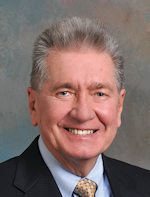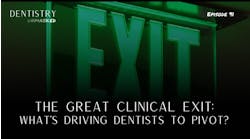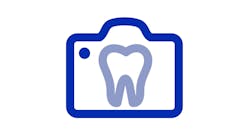Finding a specialty practice buyer, an associate's buy-out obligations, and buy-sell agreement stipulations
Question: I am the owner of a dental specialty practice in the Midwest and have engaged a broker to help me sell it. The broker's appraisal is close to $1,000,000. It's been approximately one year since I have engaged this broker and still have no viable candidates to purchase my practice. At this point, I feel that I have no other option but to close the doors. Do you see any other choices?
Prescott: The ability to locate a candidate to purchase a specialty practice in any location is more and more difficult. New specialists as well as general dentists are becoming more hesitant than ever to commit to buying a practice or becoming a partner.
Without a viable candidate, the best you may be able to hope for is to have sufficient retirement savings to allow you to close the doors. In such case, you would refer your existing patients and referral sources to colleagues. However, because your practice has substantial value, consider not giving up on selling it yet. Contact your broker for an explanation of why there have been no viable candidates. It is possible your practice was valued on the high side. If so, you and your broker should consider whether a reduction to the selling and purchase price may help in getting your practice sold. Also, have your attorney review your listing agreement to determine if and how to disengage the broker's services and possibly engage another broker with experience selling practices in your specialty.
You might also be interested in: Associates: Salary and productivity, partnerships, and retirement
Whether or not you can disengage your broker's services, consider contacting new and existing practice owners in your specialty and area, particularly those with an associate, as an associate can increase their productivity with additional referral sources. Possibly the specialist who covers referrals for you may also be a viable candidate.
If you engage another broker, be sure to negotiate a provision in your listing agreement for local dentists in your specialty whom you have contacted and look promising to be excluded from or paid a reduced commission. Any new broker should also contact specialty programs both in and outside of your state for viable candidates.
Question: I am an associate specialist who has been asked to become a partner in an existing two-partner practice where I would buy out the senior partner. What is being proposed is that I would also be obligated to buy out the second partner in the not-too-distant future. I do not want to take this course of action. What are my options?
Prescott: Make your admission as a partner contingent on your being required only to buy your partnership interest from the senior partner who is retiring. The second partner should not be permitted to retire and be fully paid for his or her interest under a buy-sell agreement until a third associate is hired and admitted as a partner who would purchase the second partner's interest. The buy-sell agreements could state that, if the second owner decides to retire before a third partner is admitted, the buy-out price would be substantially reduced, possibly by 50%.
Another option is for you to make an offer to buy out your restrictive covenant and either join another area practice or establish a practice on your own. While you would have an established referral base, you would have to build out your facility and purchase equipment.
Finally, you can leave and practice outside of your restrictive covenant or even relocate, if it’s an option.
Question: I am planning on retiring as a partner in approximately one year. My junior partner and I, in our two-doctor practice, do have a buy-sell agreement that specifies the purchase price for my stock in our S corporation. Because our practice has been doing very well, I recently authorized another valuation to be prepared. The purchase price for my stock is now substantially higher than under the current buy-sell agreement. Is there anything that I can do to obtain the higher difference in value?
Prescott: While you can discuss the disparity of the buy-out price with your partner in light of how well your practice has been performing, there is probably nothing you can do if your partner refuses to budge on the price. However, there may be some accommodation that can be made for your partner to agree on an increased buy-out price. Such an accommodation could be your agreement to continue to work in your two-doctor practice until a new associate can be hired, trained, and later admitted as a shareholder. Otherwise, your partner will have to search for a third dentist to replace your production.
In any case, your CPA should review your buy-out formula to determine if it took into account the tax balancing effect to you and your partner. The proceeds from the sale of stock will be favorable capital gains to you and nondeductible to your partner. Because valuations typically do not balance the tax effects on partner buy-outs, your buy-out price may be more favorable than you think.
If the new valuation is truly higher than your buy-out formula, despite the taxation, another option may be for your partner to permit you to search for and locate a new successor to buy out your interest at the higher value. But this may be easier said than done because the new doctor would have to work with your partner who is now the senior doctor.
Editor's note: This article appeared in the February 2024 print edition of Dental Economics magazine. Dentists in North America are eligible for a complimentary print subscription. Sign up here.
William P. Prescott, JD, EMBA, of Wickens Herzer Panza in Avon, Ohio, is a practice transition and tax attorney and former dental equipment and supply manager and representative. His most recent book, Joining and Leaving the Dental Practice, 4th edition, is available through the ADA Center for Professional Success. ADA members can download the e-book for free at ada.org/resources/careers/joining-and-leaving-the-dental-practice. For this and Prescott’s other publications, visit prescottdentallaw.com. Contact him at (440) 695-8067 or [email protected].







